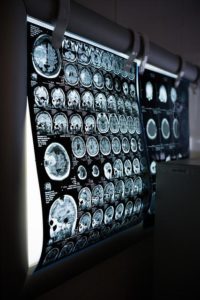Traumatic brain injuries (aka closed head injury) are a major cause of disability and death in adults. Traumatic brain injuries occur when a sudden, external, physical assault damages the brain. One common cause of traumatic brain injuries is car crashes.

When a traumatic brain injury results from a car crash, the injury is most frequently a closed brain injury. This results in bruising and tearing of brain tissue and blood vessels.
Like many injuries, traumatic brain injuries range in severity. Traumatic brain injuries can be focal (confined to one area of the brain) or diffuse (involving multiple areas of the brain) and can cause injuries ranging from mild concussion to severe injury resulting in permanent disability or death.
Definition and causes of a traumatic brain injury
A traumatic brain injury (TBI) is a complex injury that can lead to a wide range of symptoms and disabilities. It occurs when a blow or jolt to the head or body disrupts the normal function of the brain.
Not every hit to the head results in a TBI, but when it does, the severity can vary from mild to severe. TBIs can be classified as either penetrating, where an object pierces the skull and enters the brain tissue, or non-penetrating, where the impact does not break the skull.
Common causes of traumatic brain injuries
Traumatic brain injuries can result from various incidents, including:
- Falls are the leading cause of TBIs, particularly among older adults and young children
- Motor vehicle crashes are a common source of TBIs, especially among young adults
- Sports injuries can lead to a sports related concussion
- Physical assaults can also cause a penetrating tbi
- Explosions and blasts are significant causes of TBIs among military personnel
Who is at Risk for Traumatic Brain Injuries?
Certain groups are more susceptible to traumatic brain injuries, including:
- Children and adolescent due to their active participation in sports and other high-risk activities.
- Young adults are often involved in sports and high-risk activities.
- Older adults have a higher risk of falls, which can lead to TBIs.
- People who participate in contact sports like football and hockey increase the risk of TBIs.
- People who work in high-risk occupations like construction, manufacturing, and other high-risk fields can lead to TBIs.
By understanding these risk factors, individuals and caregivers can take proactive steps to prevent traumatic brain injuries and protect those who are most vulnerable.
What are some symptoms of a severe traumatic brain injuries?
Just as they range in severity, TBI symptoms do not always manifest the same. Individuals who have suffered from brain injury may experience one or more of the following:
- Cognitive deficits – i.e. confusion, problem-solving difficulty, shortened attention span, amnesia
- Motor deficits – paralysis or weakness, poor balance, decreased endurance
- Language deficits – difficulty speaking or understanding speech (aphasia), difficulty reading (alexia), difficulty writing (agraphia)
- Functional deficits – difficulty performing activities of daily living (dressing, eating, bathing), problems with organization, inability to operate a motor vehicle
- Social difficulties – impaired social capacity
- Regulatory disturbances – fatigue, dizziness, headache
- Personality or psychiatric changes – irritability, decreased motivation, anxiety and depression
- Traumatic epilepsy
For a more complete list of the possible effects of brain injury, click here.
Will a brain scan tell me whether I have a traumatic brain injury?
Given that traumatic brain injuries cause direct injury to the brain, you might expect that those injuries would necessarily be seen on brain scans, but that isn’t always the case.
Traumatic brain injuries affect the brain in two major ways: first bruising or tearing of brain tissue; and injury to microscopic nerve fibers (axons), which connect nerve cells in the brain (neurons).
Because traumatic brain injuries can result in microscopic injury to the brain, it may go undetected by magnetic resonance imaging and/or computed tomography scans. But that does not make the injury any less real.
I’ve been diagnosed with a traumatic brain injury – what now?
If you’ve suffered a traumatic brain injury and are experiencing one or more symptoms, you may be wondering: Is there anything I can do to help my brain recover? And will I ever get back to normal?
Understanding prognosis: mild vs. severe traumatic brain injuries
The prognosis for a traumatic brain injury (TBI) largely depends on its severity.
- Mild TBI (e.g., concussion): With this type of injury, recovery of most or all brain function is often achievable over several months with minimal intervention.
- Moderate to severe TBI: These cases may require specialized treatments and interventions due to more significant damage and longer-lasting effects.
Treatment options for moderate to severe traumatic brain injuries
For those with moderate to severe TBIs, medical professionals may use various interventions to support recovery, including:
- Neurosurgery, to address physical damage, such as brain bleeds or skull fractures.
- Rehabilitation services, such as Occupational, physical, and speech/language therapies help regain lost abilities and improve everyday functioning.
- Psychological and/or social services assist with emotional challenges and adapting to long-term changes in lifestyle.
Emergency care for a traumatic brain injury
Immediate medical attention is often critical after a traumatic brain injury. Emergency care typically focuses on stabilizing the patient and minimizing further damage. Key steps include:
- Ensuring adequate oxygen and blood flow to the brain.
- Maintaining healthy blood pressure levels.
- Preventing additional injury to the head or neck.
Medications may also play an important role in managing the injury:
- Anti-seizure drugs are used to prevent seizures after the trauma.
- Diuretics are medications that help reduce brain swelling.
- Coma-inducing drugs are administered in severe cases, they protect the brain by reducing its activity and energy demands.
For some individuals, emergency surgery may be necessary to remove clotted blood, stop brain bleeds, repair fractures, or alleviate pressure within the skull.
Long-term effects and rehabilitation
Many individuals with severe TBIs will continue to experience long-term effects following the initial medical interventions.
Rehabilitation is key to helping patients recover and improve their ability to perform daily tasks. Common goals of rehabilitation include relearning basic motor skills, improving cognitive abilities, and adapting to life with any permanent impairments.
By understanding your injury and working closely with a medical team, there are pathways to recovery and management even with significant challenges. Rehabilitation specialists may include:
Occupational Therapist
Occupational therapists help patients relearn and adapt to daily living tasks, such as dressing, cooking, and managing personal hygiene. They focus on improving fine motor skills, hand-eye coordination and cognitive abilities needed for independence.
For those with severe limitations, occupational therapists may suggest adaptive tools or techniques to make daily activities more manageable.
Physical Therapist
Physical therapists assist with regaining strength, balance, coordination and mobility after a traumatic brain injury.
They design exercise programs to rebuild muscle strength, improve endurance and address physical limitations caused by the injury. For patients with severe impairments, physical therapy can focus on using assistive devices like walkers or wheelchairs.
Speech and Language Therapist
Speech and language therapists address communication challenges that arise from traumatic brain injury, such as difficulty speaking, understanding language, or swallowing (dysphagia). They also work on cognitive-communication issues, such as memory, problem-solving and social interaction skills.
Neuropsychologist
Neuropsychologists specialize in assessing and treating the cognitive and emotional effects of a traumatic brain injury. They evaluate memory, attention, problem-solving abilities and emotional well-being, helping patients and their families understand the injury’s psychological impact. They may also develop strategies to compensate for cognitive deficits.
Social Worker or Case Manager
Social workers and case managers coordinate care and provide support to traumatic brain injury patients and their families. They assist with navigating medical systems, accessing community resources and managing financial or insurance issues.
They also help connect patients with support groups or counseling services to address emotional and social needs.
Rehabilitation Nurse
Rehabilitation nurses focus on managing the medical and physical needs of traumatic brain injury patients during recovery. They provide education about medication management, prevent complications like pressure sores or infections, and ensure patients are following rehabilitation plans effectively.
Recreational Therapist
Recreational therapists use leisure activities and hobbies to help patients regain confidence, improve physical abilities, and enhance emotional well-being.
Activities may include art, music, sports or outdoor activities tailored to the individual’s interests and abilities, fostering a sense of normalcy and enjoyment.
Vocational Counselor
Vocational counselors help patients transition back into the workforce or explore alternative career options after a traumatic brain injury.
They assess the individual’s abilities, provide job training and connect them with opportunities that align with their new skill set. For those unable to return to work, vocational counseling may focus on volunteer opportunities or other meaningful engagements.
Psychiatrist
Psychiatrists treat mental health conditions that may arise or worsen after a traumatic brain injury, such as depression, anxiety or mood disorders. They may prescribe medication to stabilize mood, improve sleep or manage other psychological symptoms.
Psychiatrists often work closely with neuropsychologists and therapists to address the emotional and cognitive challenges associated with traumatic brain injuries.
If you or a friend or loved one have suffered a traumatic brain injury at no fault of your own, call us for a free consultation with a traumatic brain injury lawyer by calling 866-388-1307.




